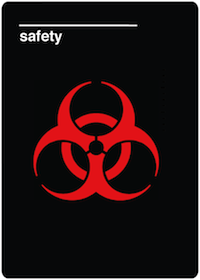Team:Austin Texas/safety
From 2014.igem.org
| Line 76: | Line 76: | ||
When working with ncAAs and amberless ''E. coli'', our iGEM team considered a number of potential safety hazards, including the fact that we were working with a genetically modified organism. | When working with ncAAs and amberless ''E. coli'', our iGEM team considered a number of potential safety hazards, including the fact that we were working with a genetically modified organism. | ||
| - | Biological safety precautions were taken, and although not required, we filled out a check-in form for the amberless ''E. coli''. If our project ever grew in scale, it would most likely involve us sending the plasmids we've designed in amberless ''E. coli'' to other labs. Our plasmids are not inherently dangerous; they only contain antibiotic resistance genes and a fluorescent reporter. The main risk would be that by sending out amberless ''E. coli'' to more labs and increasing its use, the chance of it escaping would increase. However, the amberless ''E. coli'' are significantly less fit than wild-type ''E. coli'', and will not survive very long in the wild. Should the project ever grow, we may want to add some sort of way to kill the amberless ''E. coli'' should they ever escape, or make them auxotrophic in some way so that they would not be able to survive if they escaped. This might be accomplished by making them depend on a supplemented ncAA for survival. | + | Biological safety precautions were taken, and although not required, we filled out a check-in form for the amberless ''E. coli''. If our project ever grew in scale, it would most likely involve us sending the plasmids we've designed in amberless ''E. coli'' to other labs. '''Our plasmids are not inherently dangerous; they only contain antibiotic resistance genes and a fluorescent reporter.''' The main risk would be that by sending out amberless ''E. coli'' to more labs and increasing its use, the chance of it escaping would increase. '''However, the amberless ''E. coli'' are significantly less fit than wild-type ''E. coli'', and will not survive very long in the wild.''' Should the project ever grow, we may want to add some sort of way to kill the amberless ''E. coli'' should they ever escape, or make them auxotrophic in some way so that they would not be able to survive if they escaped. This might be accomplished by making them depend on a supplemented ncAA for survival. |
The only potential chemical safety concern of working with the ncAAs used in this project was that a strong base was required to dissolve one of the compounds. Otherwise, the risks were minimal, and as long as PPE was worn, there was no significant danger to us, the lab, or the community. | The only potential chemical safety concern of working with the ncAAs used in this project was that a strong base was required to dissolve one of the compounds. Otherwise, the risks were minimal, and as long as PPE was worn, there was no significant danger to us, the lab, or the community. | ||
Latest revision as of 22:31, 17 October 2014
| ||||||||||||||||||||||||||||
 "
"

